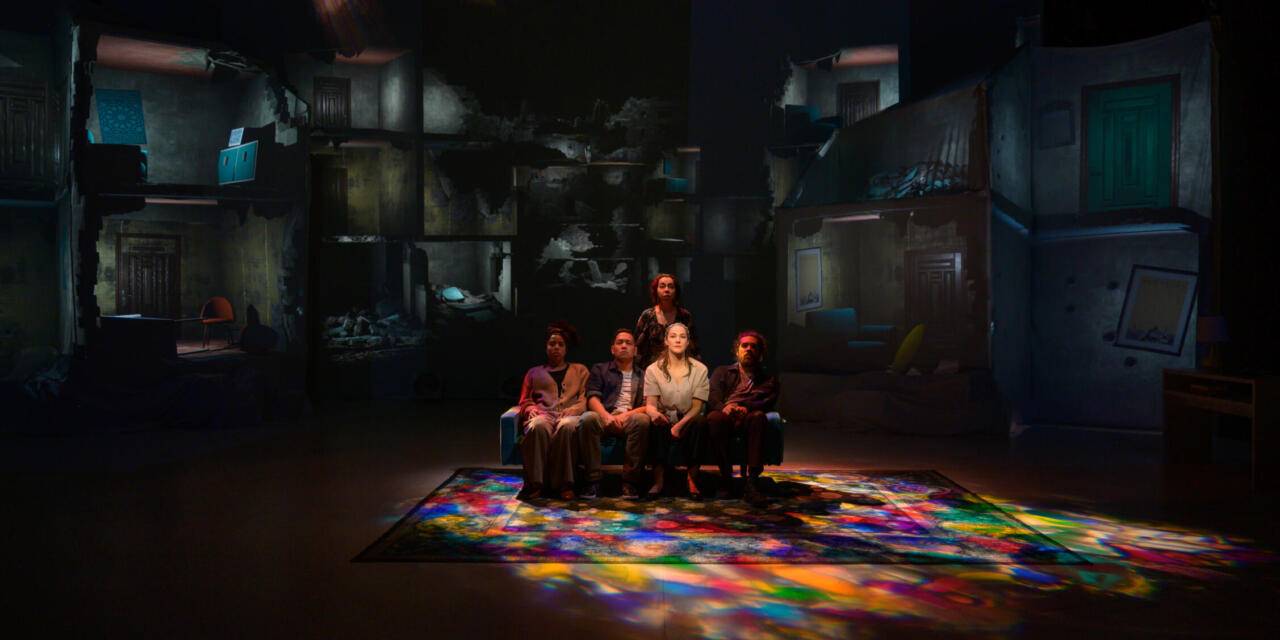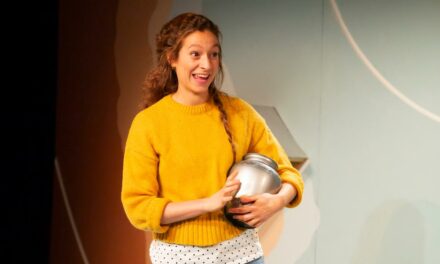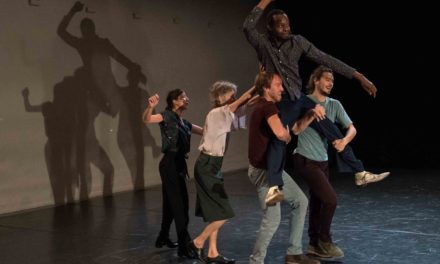Directed by Fadi Skeiker with Wilma Hothouse Company favorites, the show’s physical and visual landscape exposes the West’s internalized cultural appropriation.
In the audience of the Wilma Theater, we think we are here for a play. But after the first beat of the show, we realize it is perhaps a different kind: a television show. The audience is a part of a live studio audience facing a long, chromatic home in Damascus, Syria. The room is alive with yellow and blue furniture, framed by a rectangular curtain that makes the stage a television screen. And the characters that come on are so enormous that it pushes them right out of the frame.
The play’s original premise is that the day of the week has come where two couples meet to watch the new episode of their T.V. show. But Youssif (Anthony Martinez-Briggs) has shown up early to Hadeel’s (Taysha Marie Canales) to confess: he is in love with her. Youssif’s girlfriend Bana (Sarah Gliko) and Hadeel’s fiance, Ahmed (Justin Jain) will be knocking on the door soon.
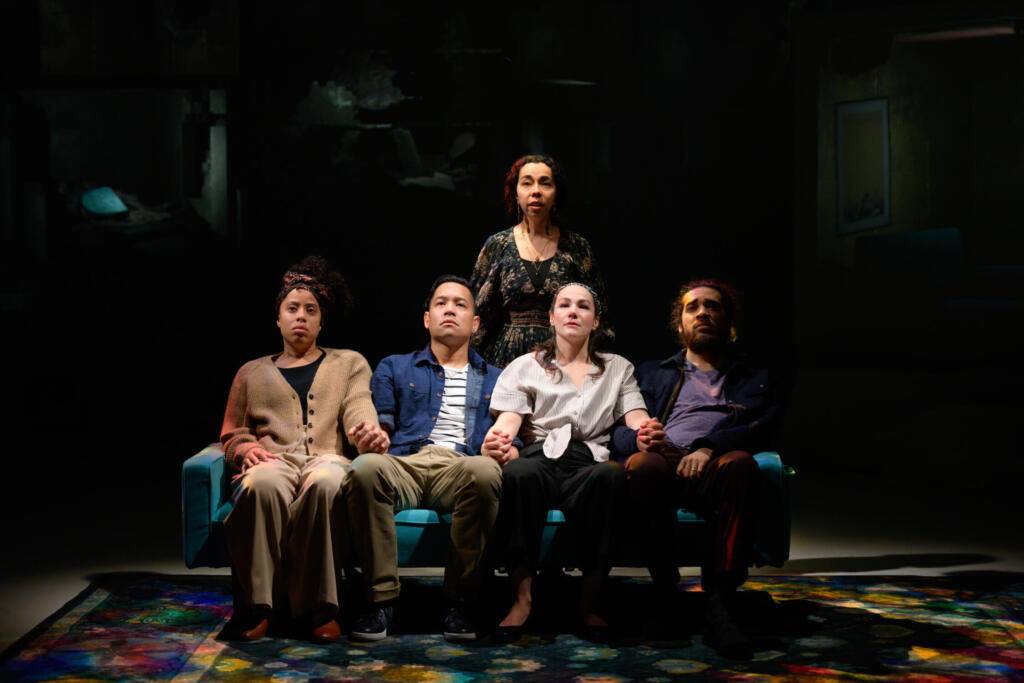
Photo by Johanna Austin.
KISS by Guillermo Calderón is a curious piece, considering that it is set in Syria and Calderón is Chilean. Although there are themes of the piece that are similar to Calderón’s experiences under the Pinochet dictatorship, the play challenges our capacity to empathize with traumas outside of our own cultures.
In an interview with American Theatre, Calderóne says the decision to write about Syria and the issue of cultural appropriation was because “Theatre and culture need cross-pollination.” To him, those unknown relationships are what will create, “understanding of what’s going on in our culture and in others.” The Wilma’s production is particularly successful because Director Fadi Skeiker makes conversation with the show’s politics through physicality.
Skeiker was born in Syria and studied theatre in Damascus. In an interview for BroadwayWorld, he explains that he views theatre as a unifying force, specifically for “Syrian refugees and diasporic immigrant communities.” In addition to holding theater workshops for immigrants across the world, Skeiker feels directing a show like KISS can deliver just as much power.
His vision heightens the seeming soap-opera genre of the “show.” The spectacle is not the actors’ language, but their bodies. Their kinosphere has no dimension as they live in dramatic physicality and animalistic lust. From Bana’s leaned strut to Hadeel squawking like a bird, the audience is entranced as they growl, moan, pant, or squeal through every scene. The actors rarely face one another during a conversation. One stands in a spotlight while their scene partner embodies their shadow, echoing their gestures and movements. As Youssif soliloquizes about Hadeel, she is his shadow, mimicking his inflections with her body.
Skeiker directs his virtuosic cast without a hint of naturalism. I became obsessed with each absurd plot twist, mirroring the characters’ own obsession with their soap opera. He has built in the “APPLAUSE” and “LAUGH” signs into the script. A suite from the Nutcracker plays while the group has tea. Cartoon hearts and flames erupt on the screen behind them as they declare their love. It is all so mythological and manic that an audience in Philadelphia is bewitched by the style, not knowing that will soon expose their complicity.
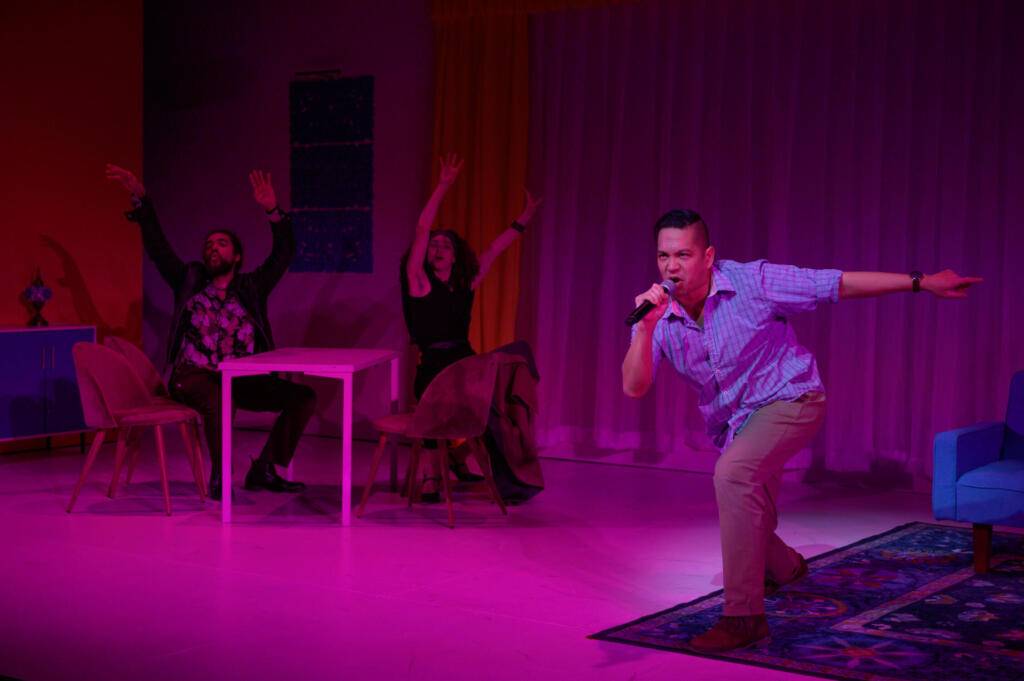
Photo by Johanna Austin.
The plot reaches its finale when Hadeel collapses to her death of a “broken heart,” and a blackout provides a conclusive button. But suddenly, the house lights are back up. The crew wheels on a screen and four chairs for the actors. They change out of their costumes and drink from their water bottles as they welcome us for a post-show Q&A with the playwright, Ameera– or so we think. Although we think the show has entered a more naturalistic tone, Skeiker’s style is maintained. Alongside “the playwright” is an interpreter, stacks of books wobbling in his hands. The audience giggles, still under the comic spell.
But through the excruciatingly naive questions of the four actors, we learn the play was a different kind of tragedy than we thought. Did we hear the gunshots outside of the house that were written into the text? No. Hadeel was erratically changing her mind because she was exposed to chemical weapons. Was she coughing? Not noticeably. And Bana, based on the late Syrian actress May Skaf, did not “kiss someone,” this was a code that she was raped while detained by the police.
In Arabic, Ameera’s voice shudders, “I miss soap operas because I miss crying for simple things.” The only time when there is acting closest to reality, we cannot understand it. In this moment, Skeiker’s choice is deflected back at us: a Western audience witnessing the inner workings of our own cultural appropriation and confronting our ignorance to the hardship of others. The audio becomes more gargled and staticky, and the actors try to wave, saying goodbye to “Ameera” until she reveals: “But I’m not Ameera. I’m her sister. She died last November.”
In directing the show, Skeiker sympathizes with the Western actors. The production does not offer them forgiveness, but does give them a chance. And ingeniously, the vibrant physicality makes their deafness to the issue feel even more condemnable by the end. In masking their mistakes, he has made a space for those in the audience to hide, too— putting our own complicity in the light by the end.
To say this play attacks the issue of translation is the exact kind of excuse it is exposing. Translation is not an issue of ancient texts, one to be blamed on the distance of time and collective memory. It is a crime of willful ignorance and cultural neglect. And the Wilma’s physicalization of language is a darkly humorous manifestation of cultural appropriation that does not leave any audience without considering their own personal shame.
This post was written by the author in their personal capacity.The opinions expressed in this article are the author’s own and do not reflect the view of The Theatre Times, their staff or collaborators.
This post was written by Emily Maiorano.
The views expressed here belong to the author and do not necessarily reflect our views and opinions.

